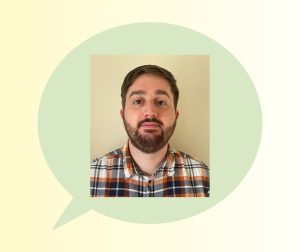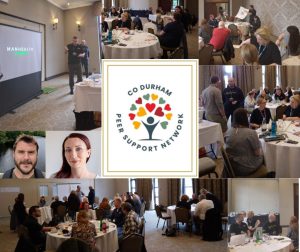
Life has come full circle for Callum O’Keeffe – and he couldn’t be happier about it.
The 30-year-old, from Stockton, found inspiration in the care he was given while struggling with his mental health as a young adult.
Now he is supporting others as a senior peer support worker with our Trust and using his personal experiences to help guide people through the darkness he survived.
“I will forever sing the praises of the peer support worker that was assigned to me, as I genuinely don’t know whether I would be here today if it wasn’t for her,” he said.
“At first, I found it hard to trust those who tried to help me. I ended up frustrated and going round in circles, but she held out a lot of hope for me when I didn’t have any.
“It’s hard to have hope when you’re in that dark place. Peer workers have been there and come out the other side. Everyone’s journey is different, but they are there for you.”
Difficult childhood
Callum’s mental health struggles began at 11, when playground gossips revealed his father had taken his own life – and not died of natural causes as Callum had been told.
The knowledge became a “sort of secret” he carried around with him and, as a teenager, he became increasingly angry and anxious – often acting up at school or skipping lessons.
“I never talked about what happened to my dad until I was 18, when I told my nan I knew everything. She was the first person I trusted enough to talk to about it,” said Callum.
“She tried to help me deal with some of the feelings I had around the situation. That helped, it really did. She tried her best for me, and life started to get a bit better.”
Health struggles
Just a few years later, while studying for a degree in civil engineering, Callum’s new-found happiness was sadly shattered.
While leaving for university one day, he found his grandmother having a stroke. The episode left him worried for his gran, and triggered his old memories of loss and grief.
“Although my nan recovered, I became quite fearful of leaving her alone in case it happened again. I was worried no-one would be around to help her,” said Callum.
“Over the next year or so, my mental health spiralled to the point where I couldn’t leave the house. Just the thought of leaving was enough to trigger a panic attack.”
Finding hope
Such was the severity of Callum’s anxiety that his grandmother contacted the Trust’s crisis team for support. A month later he was admitted to Roseberry Park Hospital for treatment.
It was following his release into rehab that he met his first peer worker, Jodie, who used her own lived experience to help him trust in the system and the recovery options available.
“As a patient I found it difficult at first to talk to medical staff, but I found myself genuinely opening up with Jodie, as we shared similar experiences,” he said.
“My initial fears about talking sort of subsided through having that kind of relationship with a peer. It actually helped to strengthen my connections with the wider team as well.”
Looking to the future
As Callum worked with the rehab team and Jodie on his recovery journey, so he started to develop his own set of goals around what he wanted out of life.
His ultimate ambition became to work as a peer himself – and in 2020 he turned his dream into reality after securing an apprenticeship with the charity Humankind.
“I was inspired by the care I received and wanted to give back to people that were in similar situations to where I’d found myself,” he said.
“My nan was incredibly proud of me. I remember her saying “I’ve got my grandson back!” after I left hospital. She was 5ft nothing and the strongest person I ever met!”
Helping others
Callum now works for our Durham and Darlington rehab and recovery team, where his lived experience plays a key role in helping to develop future treatments and services.
He said: “I’m here to support people and co-creation is vital. To me it means everybody’s voice matters, everybody is equal in a discussion. There isn’t a separation between us.
“With co-creation we have lived experience and clinical voices in one room. It’s not a case of well, they’ve asked for this, but we are doing this – everyone has their input in decisions.
“As peer workers we bring a lot of ourselves to our work, and it is good to know that our lived experience is valued.”
